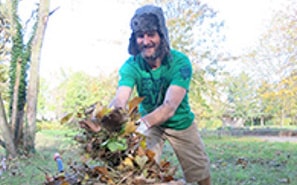Schizophrenia and Work: Volunteering
For many people living with schizophrenia there comes a time in their recovery when they realise that they have managed to return to quite a high level of functioning and although they may still have some residual symptoms the question of what they are to do in the future becomes important.
At this stage it may be slightly too soon to think about getting a paid job or going to college. You may feel that you are still not up to it. However it is important to occupy your time usefully and so continue the progress you have made in your recovery so far. It is important not to sit back and relax at this point but to try to keep up the momentum of your recovery. In addition it is useful to try to use your time in a way that will benefit your plans for the future and that is where volunteering comes in.
If you are thinking about volunteering you are not alone. In 2012 about 45% of the adult population of the UK were involved in volunteering of some sort.2 Volunteering is a very popular way for people who have time on their hands to use it productively.
Volunteering involves working for a charity or community group. The work is usually part-time and is unpaid although some organisations may give you help with travel-to-work expenses or help with buying a meal while you are at work. The number of hours you will be expected to work is usually by agreement with the organisation but can be from a few hours per week to two days.
The term volunteering usually refers to working for a non-profit organisation such as a charity or community group. It does not cover working unpaid for a profit making company which is usually called work experience or an internship.
Benefits of Volunteering for People with Schizophrenia
There are many benefits of volunteering. For instance:
· You can learn work –related skills such as in retail or gardening
· You can learn transferable skills such as administration or computer skills
· You will learn or re-learn basic work skills like punctuality
· Volunteering gives you something to get up for in the morning
In addition volunteering gives you important human benefits that you will need in your recovery. It will give you that all important contact with other people who do not have mental health problems and help you to communicate and relate to them better. It will also improve your narrative; your life story and improve your status in the community with huge benefits for your self-esteem. And importantly it will enable you to contribute to the society that you live in. It will be your opportunity to give something back and even to make your small contribution to making your society a better place.
In some organisations volunteers are also able to gain valuable vocational qualifications whilst doing their volunteer work.
What Sort of Volunteering Opportunities are Available
The range of things that you can do as a volunteer is very wide indeed: everything from helping to mentor young people to clearing up beaches. Here are some of the posts advertised on the internet today:
· Dog walking
· Meals on wheels driver
· Conservation work
· Gardener
· Cook
· Marketing and publicity
· Website assistant
· Painter
· Receptionist
· Shop assistant
And the list is virtually endless.
A Green Day Out with the Conservation Volunteers.
Reproduced by kind permission of TCV and film maker Deanna Allison
How to Start Volunteering
Choosing an Organisation to Volunteer With

Working in charity shops such as those run by Oxfam provide valuable experience in retail and that all-important entry in your CV. (Image: Thinglass/Shutterstock)
Small, local community groups especially ones that have not been established for very long can be slightly risky. They may not yet have in place good procedures for working with volunteers and you may find that they can’t give you the depth of experience that a larger organisation can give you. In addition they may not carry the right kind of insurance to protect you if you had an accident while working for them.
It is usually best to start with a large, well known charity with a national reputation and which have their own local premises. Working for a large, well-known national charity will also be better for your CV and help you to get paid employment later on.

Conservation work such as TCV’s Green Gym scheme can be interesting and rewarding. It will also help you to relax and sleep better. (Image: TCV)
You may like to choose a volunteering option that is good for your physical health such as conservation work or gardening. The charity The Conservation Volunteers runs a scheme called the Green Gym, http://www.tcv.org.uk/greengym/how-green-gym-works which is all about getting people out in the countryside to do moderately strenuous work that is both good for the heart and helps the environment.
You may also like to think about an occupation that you will find relaxing and that will help you to manage your stress. In addition there may be a good cause that you feel strongly about and would like to support such as caring for the environment.
Finding an Organisation
The best place to start looking is on the internet. There are a number of websites such as Timebank http://timebank.org.uk/ and Volunteering England http://www.volunteering.org.uk/ that specialise in matching volunteering opportunities to people looking for places.
You should also pay a visit to your local reference library where you will find the staff will be only too happy to help. If you are at university you will find that the student union will often have a volunteering scheme.
Starting Volunteering
When you start volunteering you are not usually given a written contract of employment but the organisation is still bound by basic employment legislation such as the Health and Safety at Work Act, Data Protection Act, etc. However some larger organisations will give their volunteers a written agreement setting out what they expect from the volunteer and what the organisation in turn will do for them. This is good practice but it is worth remembering that this is not the same as a contract of employment and does not confer the same legal rights.
If you choose a well organised charity you can expect to go through an induction procedure, often called volunteer orientation, when you start which will help you to understand some of the tasks that you will be working on and also make you aware of basic issues such as health and safety and welfare.
Volunteering and State Benefits
If you are claiming any state benefits there are strict limits on the amount of time that you can spend on voluntary work each week so it is important that you speak to the Jobcentre before you start volunteering. In addition if you receive any kind of payment for your volunteering except for small amounts of out-of-pocket expenses for travelling etc then it will affect the amount of state benefits that you are paid.
Things to Watch Out For
It is important that you establish some boundaries early on. Decide how many hours you can work without putting yourself under too much pressure and stick to it. Don’t be pressured into doing more than you can cope with. Charities are always short of volunteers and they may ask you to do more hours. Remember that if you volunteer for too many hours it may affect your entitlement to state benefits.
Similarly don’t accept extra responsibility unless you feel totally confident that it won’t put you under excessive pressure. Even then you need to be wary of accepting too much responsibility because if you become too involved with your work for the charity it may take up time and effort that could later usefully be spent looking for a paid job. Whilst volunteering can be an extremely beneficial part of your recovery, it is important to have a clear idea of what sort of occupation you ultimately aspire to have and if that is paid work, don’t let your volunteering distract you from this aim.
Working for organisations that help certain groups of people such as children or vulnerable adults may require you to have a check carried out into any criminal records called a CRB (Criminal Records Bureau) check. If you have had any contact with the police including being detained at a place of safety for the purposes of a Mental Health Act assessment (known as a police section) then this will appear on your CRB check. These sorts of organisations usually insist on their volunteers having a clean CRB check so if you are thinking of volunteering for this sort of work it would be best to discuss the issue first with your Community Psychiatric Nurse (if you have one) or with the organisation before you start working with them.
Sadly, whilst most charities and community groups are decent and fair, not all organisations will have your best interests at heart. Some may be frankly exploitative and may not treat you fairly. If you feel that you are being used then it is best to cut the link and try somewhere else.
Lastly, if you find that after giving it your best efforts for several months and you are still not enjoying the work then it may be best to leave and try another kind of work at another organisation. Sometimes the chemistry is not right or we have just tried to put a square peg into a round hole and we just have to put it down to experience and try something else.
Useful Links
Timebank
http://timebank.org.uk/
CSV
http://www.csv.org.uk/?display=volunteering
Volunteering England
http://www.volunteering.org.uk/
The Conservation Volunteers
http://www.tcv.org.uk/greengym/how-green-gym-works
References
1. This article is based on the author’s personal experiences.
2. What do Statistics Tell Us About Changes in Volunteering, Guardian On Line, http://www.guardian.co.uk/voluntary-sector-network/2013/mar/22/statistics-changes-volunteering-levels, Viewed on line 2nd April 2013.







